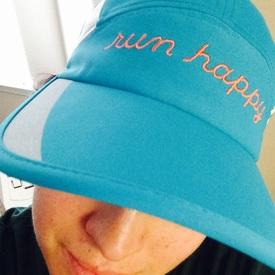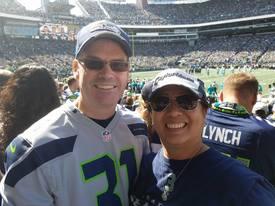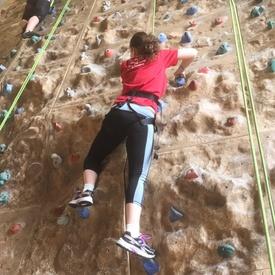Recent article on myfitnesspal

amandaherr
Posts: 3 Member
Did anyone else read the article about feeling weight loss is hopeless? I am particularly wondering about the part that says you will sabotage weight loss by counting your exercise calories toward your daily allotted calories. Anyone have any comments on this? I am at a 16 pound loss and have 95 pounds to go for goal so I need the best advice.
1
Replies
-
Counting exercise calories is dangerous as it's incredibly imprecise. Most people here suggest counting 50%or less of those calories. I tend to agree with that.
Personally, unless I exceed 500 exercise calories, I tend not to eat any back. I also try to incorporate resistance and higher impact interval training as studies show thru boost metabolic rates for longer periods of time, adding to a caloric deficit.
7 -
I just do rough counts of my calories and ensure that I'm around 200-300 under my recommended. Like ElJefePerron, I don't really count exercise unless its a day hike or a golfing trip. If I had to get a scale and calculator each time, I'd go crazy.
I think it's BS to think that calorie-counting is 'sabotage.' In fact, it clarified to me which foods were contributing most to my weight.
Congrats on the weight loss. You clearly are doing something right.4 -
I don't usually count my exercise calories but if I was extra active (gym plus a lot of physical activity during the day--more than normal) I don't sweat going a bit over, especially if I need energy. Never anything significant.
Weight loss is done in the kitchen. Weighing, logging and planning is empowering. It empowered me to have a ribeye steak and wine tonight and know I'll still lose weight.
When I started I had more to lose than you. I'm confident this will get done. Counting my calories and getting exercise is working for me. Even more, I feel terrific. My health has improved vastly.
You can do this. Don't look for reasons to be discouraged. Spend more time reading the "success stories" forum than articles that provide excuses to quit.6 -
I think the danger lies in getting stuck in the mentality of "I exercised, so I can eat whatever I want". Generally, it's very difficult to exercise enough to make up for poor food choices. Try thinking of exercise as a tool to help with weight loss and use nutritious foods and reasonable portions to fuel your exercise.11
-
I never count my exercise calories because I don't trust the measurement of calories burned1
-
When I started, I ate all my exercise calories back and it worked out perfectly fine. Lost 30 lbs with no weighing anything and eating all my calories back. For me, MFP already had me at 1200 so I felt like I would not sustain by not eating them back.
I still eat them back but I have a harder time not going over this last year and I work out six days a week. I gained about 10 lbs the last half of the year due to various "excuses" and have been maintaining so far this year but I know why. When I just eat my exercise calories back I lose but like I said, I have been over. I try not eat my Fitbit calories back though so maybe since I usually get my 10k steps in and my profile is set to lightly active it has made up the difference when I do lose.2 -
I eat my exercise calories back and still consistently hit my weekly weight loss goal. I realize I may be in the minority though.3
-
This content has been removed.
-
I lost all my weight eating back exercise calories. Not all of them but most. Lost 87 lbs and I'm in maintenance now. I seriously don't think I could've kept it up long term if I hadn't eaten them back.6
-
I looked up the article, because the few times I've read an MFP article/blog/whatever the heck they're called on here, I actually haven't agreed with them.
I think you're latching onto one thing in that article rather than the larger picture. It just mentioned that a Vox article looked at studies saying that counting calories from exercise will sabotage your weight loss. Now, I'm not going to look at those studies to see what the context of that statement is. Did you? Maybe it would clarify things for you.
What I will say is that if I didn't count my calories from exercise and accurately account for my activity level, I would really be under eating. I chose sedentary on MFP because I have a kind-of desk job. However, with intentional non-exercise movement throughout the day, most work days I am much more active than sedentary. Then I add exercise on top of that. I can't adequately fuel all of that on a sedentary setting with no adjustments (I use a Fitbit and allow that to adjust my calories as necessary).5 -
I've eaten back my exercise calories (most or all of them) while losing 60+ pounds April 2015-March 2016, and while maintaining at around 120 pounds since then.
I do estimate exercise calories conservatively (heart rate monitor, comparison with MFP & other, more multi-variable exercise calculators, then pick the low end).
I'm pretty active, and if I cut calories too far (which happened briefly during weight loss), I get fatigued. But I'm old (60), plus hypothyroid, so those may be why it hits me harder if I get too deep a deficit.2 -
OP do you have a link to this article?0
-
The only reason I got a fitbit is so I could better estimate my calories out and know how many to eat back. I am pretty sure it overestimates, so I don't eat all of them back.3
-
I eat back half my exercise calories, and have lost weight steadily since I started really tracking my intake/output. *shrug* And if I've done serious cardio that day? I NEED those calories or I end up with the hangries.3
-
I don't usually eat my exercise calories back, unless I burn 400-500 cals then I might eat an extra 100 or so. I'll only eat some of them back if I'm hungry knowing I have some extra calories. I've found this has been working for me personally.0
-
I count my exercise calories ... but low, of course. I know that most calorie counters overestimate the number of calories burned while exercising so I choose slow speeds and light workouts even if I actually put in quite a bit of effort.
When I was actively losing weight, I ate about 50% of my exercise calories back.
Now that I've lost 25 kg (55 lbs), and I'm closer to maintenance, I eat about 80-90% of my exercise calories back.
Works for me. 1
1 -
I eat all of my exercise, lose exactly as I should. A someone else said, I'd be undereating and just plain hungry if I didn't eat them and I only ever have set my goal to 1lb per week.
I do however use an HRM and a smart watch with a gym specific app for my calorie and step counts.
Women who eat 1200 gross and exercise quite intensively scare me a bit with the damage they are probably doing to their bodies. Assuming those 1200 calories are accurately tracked of course.
And there's the rub. Generally, those who complain eating all of their calories or a good proportion of them and complain it stalls their losses aren't tracking their food accurately enough. Making the fault their accuracy of intake and not the accuracy of output.6 -
I don't feel this is an issue for me. I count and eat back my exercise calories without problems. I'm reasonable of course, I don't expect to rack up 500 calories in 30 minutes of "cleaning", but things like walking and running are pretty predictable and consistent calorie-wise.
I also don't see an issue with the "exercise to eat more" mentality if you understand what reasonable burns look like and don't have an eating disorder. This whole "exercise for this purpose and nothing else" doesn't gel with me. People should be free to exercise for whatever reason they want and shouldn't feel ashamed if they secretly have "inferior" reasons like calorie burns or looks. Those extra 2-300 calories can enhance a meal in great ways or allow for an extra snack that wouldn't have been possible otherwise.3 -
I eat all my exercise calories back whether losing or maintaining and my weight follows suit - that's roughly 3500 in winter and sometimes 7000+ a week in summer.
It's not a flawed method, the flaw is in how people apply the method.
For most people, even a high exerciser like me, the accuracy focus is better spent on your food intake which has a far greater impact.4 -
I'm in maintenance and I count calories and enjoy eating and drinking every single one of my exercise calories back. I didn't eat all of mine back when losing but that wasn't because of inaccuracy, that was because I wanted to lose faster and didn't feel like I needed to feed my body more than what it was asking for.1
-
I eat 100% of my pedometer calories and lose at the rate I expect to.0
-
I have a fitbit and eat back between 50 and 75% of those 'earned' calories. The wiggle room I leave is to give me a bit of a buffer in case my food logging or the calories burned is a bit inaccurate. The closer you get to goal weight, the more critical remaining in a predetermined calorie deficit becomes. I lost 75 lbs this way.
 1
1 -
I log the calories burned according to my heart rate monitor, and usually eat back about 80% of them. I also lose at the rate I expect to. I would not be able to sustain a diet that did now allow me to eat a reasonable amount of calories every day, and eating back my work-out calories allows me that.1
-
I think most of the fault lies with the user. Many people don't lose when eating back exercise calories because they don't weigh their food and they're eating more than they think or they overestimate their activity level and log all exercise on top of the extra calories they get based on their activity level. We all know that the calorie burns in the MFP database are overinflated for the most part. That being said, I've seen people log things like "Cleaning, 60 minutes, 800 calories burned" or "Cooking, food prep, 90 minutes, 450 calories burned". As ridiculous as those numbers are and ignoring the flaws of the exercise database to begin with, you have to question the logic of anyone who accepts those numbers as reality. "Well, MFP says it so it must be true!" If it were that easy to burn off so many calories, people would not be overweight to begin with.
Regarding the calories earned from fitness trackers, while there is a margin of error to consider, I've seen people claim they are so far off the mark but the same people have acknowledged that they did things like eating back calories from steps they know they earned by driving just because their fitness tracker said they could do so. That's inane and of course will produce little, if any, results. You have to analyze the data and adjust or else you're not going to make progress at all. You can't expect a fitness tracker to do everything for you just like you can't expect it to be 100% accurate. That's just not how technology, or the body, works.
I'm always nervous for new users when I see posts like this because a year ago when I started, I was one of the 1200 calorie people who tried everything NOT to eat back exercise calories as I would read conflicting information and didn't know any better. I'm 5'3" and started at 139 pounds which is right at the brink of being overweight. For my first two months, I lost a total of 18 pounds and was pulling an average of 2.2 pound losses per week. After those first two months, I noticed my performance suffering when I went for runs and I was suffering from insomnia but I kept pushing on. Then one day I just could not get out of bed no matter what I did. I probably slept for a total of 20 hours that day and all I could do was eat. I went to the boards and searched up similar situations. I read, read, and read some more and took the advice of eating back at least 50% of my exercise calories. My sleep improved, my run time increased, and I just felt better. Now I'm 112 pounds and enjoying eating back most of my exercise calories. It disturbs me to know that back then I passed up on so much good food out of fear of gaining weight, eating 1200 calories at 139 pounds, and now at 112 pounds, I'm over here maintaining at 2000+ calories.
In conclusion, eat back some exercise calories. Unless you truly know your activity level, start at sedentary or even lightly active. If you do not use a food scale, my suggestion would be to start with 25 % if you're using MFP's database or 50% if you're using a fitness tracker. If you do use a food scale for everything, I suggest 50% using the MFP database and 75% using a fitness tracker. Be patient and give it a few weeks, especially if you're a woman as we hold water during certain parts of the month. Pay attention to your intake and after 30 days look at your information as a whole. If you're losing at a faster rate than expected, eat more exercise calories. I know it's tempting to lose faster, but faster is not always better. You should aim for no more than 1% of your body weight per week. If you're losing slower than expected, then decrease the amount of exercise calories you eat back. The one caveat to this is that if you already have less to lose and you put in two or even one pound per week, you may hit that 1200 for women/1500 for men wall that MFP refuses to go below, so in cases like that you can't expect a two pound loss per week if eating 1200 calories only gives you a 500 calorie deficit per day. Cross reference MFP's info with another BMR/TDEE calculator and do the math.6 -
Like some other people said the real issue is that people will eat back the exercise calories. Where as you should use exercise to build muscle so you will burn more calories, and do cardio to burn fat. But a lot of people will see the number of calories they burned and say OK now I can eat all of this extra food. And that's the problem.0
-
Like some other people said the real issue is that people will eat back the exercise calories. Where as you should use exercise to build muscle so you will burn more calories, and do cardio to burn fat. But a lot of people will see the number of calories they burned and say OK now I can eat all of this extra food. And that's the problem.
That's not a problem, that's how this app was designed. I think the MFP method is a bit confusing to people because they can do it in one of two ways: include exercise in their activity level and not eat them back or set their activity level to sedentary and eat back the extra food. Several people in this thread have seen success with the second method. In some cases it's actually dangerous not to eat that extra food, especially if the person is at a low allowance and is exercising to boot.2 -
I don't weigh any of my food, I just guess and use the generic entries or scan my packages. I don't have a lot to lose so I have it set to lose .5 lbs per week so I don't have much room for mistakes. I've found that when I eat back my exercise calories I am less successful, leaving less room for food logging mistakes. I feel more deprived on the days that I don't work out and I'll go out of my way to get more calories, like walking for 20-30 minutes just to burn 100 calories so I can have a piece of chocolate. Mentally, for me, it's counterproductive. But if you actually log your calories correctly and are working out "hard", it's going to be more productive to fuel your body properly for your work outs by eating some of those calories back.0
-
I have to say the article itself was pretty hopeless, and left out a good portion of the story on both studies, and it didn't really offer much hope in the way of proper suggestions for weight loss. Was highly disappointed in the article quite frankly, and have to agree with an early poster that many of the MFP blog articles are a bit less than stellar to me also. (Take everything with a grain of salt, especially advice in forum threads!! Do your own research rather than just asking for 'opinions'.)
I have to agree with those that are saying that it is okay to eat back your exercise calories because that's not the problem. The problem is that most people way over estimate their activity and way under estimate how much they are eating. If you want to succeed in losing weight, you might want to reverse that. Over estimate your calories you eat if you can't measure accurately, like at a restaurant (otherwise measure, measure, measure), and under estimate your activity level (like don't count every little step you make to get up from the couch to go to the bathroom or check the mail, or the calories burned from 'driving in traffic', but include all your real exercise like going on a directed walk for 30-60 minutes or going for a run or a bike ride - all that stuff above and beyond 'normal activity' for you). While many have figured out how to use them properly, I really think those with fitbits that are counting every little body shift as calorie burners are doing themselves a disservice and fooling themselves (well, until they look at the scale).
If I had an article to recommend (even though the video mentioned in the article is no longer available), it'd be this one that I saw posted on the boards earlier this week about being brutally honest with yourself - http://www.bodyforwife.com/the-most-important-thing-you-can-do-to-lose-weight/1 -
Like some other people said the real issue is that people will eat back the exercise calories. Where as you should use exercise to build muscle so you will burn more calories, and do cardio to burn fat. But a lot of people will see the number of calories they burned and say OK now I can eat all of this extra food. And that's the problem.
Not a problem for me!
In fact it is a benefit of exercise ... because I exercised a lot today, I ate pizza. 0
0 -
Like some other people said the real issue is that people will eat back the exercise calories. Where as you should use exercise to build muscle so you will burn more calories, and do cardio to burn fat. But a lot of people will see the number of calories they burned and say OK now I can eat all of this extra food. And that's the problem.
@lun4wub
Sorry but's that's not correct.
Eating back the correct amount of exercise calories isn't the problem, it's how this site is designed - when you get to maintenance you will have to!
Building muscle to burn more calories is very close to being a myth, apart from the difficulty in building muscle at a deficit the very, very few extra calories burned by having a few more pounds of muscle are more than offset by the reduced energy demands from losing weight.
Cardio doesn't "burn fat" as such - it burns calories but losing fat is a result of your deficit and not any particular exercise. You can do a load of cardio and more than offset that by eating too much.
Eating the incorrect amount of calories certainly can be a problem, that's where some effort is required to make estimates "reasonable" and adjust calorie balance based on results not just calculators and estimates of both food and exercise calories.
0
This discussion has been closed.
Categories
- All Categories
- 1.4M Health, Wellness and Goals
- 398.4K Introduce Yourself
- 44.7K Getting Started
- 261K Health and Weight Loss
- 176.4K Food and Nutrition
- 47.7K Recipes
- 233K Fitness and Exercise
- 462 Sleep, Mindfulness and Overall Wellness
- 6.5K Goal: Maintaining Weight
- 8.7K Goal: Gaining Weight and Body Building
- 153.5K Motivation and Support
- 8.4K Challenges
- 1.4K Debate Club
- 96.5K Chit-Chat
- 2.6K Fun and Games
- 4.7K MyFitnessPal Information
- 17 News and Announcements
- 21 MyFitnessPal Academy
- 1.5K Feature Suggestions and Ideas
- 3.2K MyFitnessPal Tech Support Questions

























